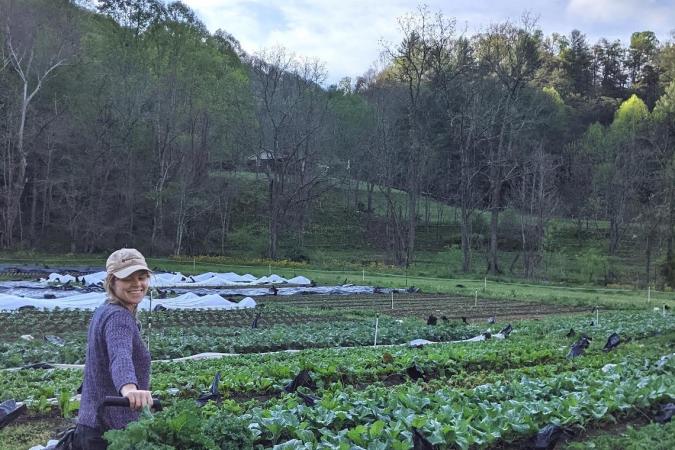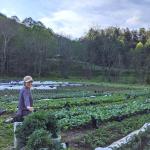Meet the Farmers
Run by co-owners Mark McDonagh and Danielle Keeter, Mighty Gnome Market Garden takes a holistic approach to farming that emphasizes resilience for communities and the land. Mark first entered the world of agriculture in his youth, working summers on a friend’s large-scale cattle ranch and commodity crop farm in Wyoming. Witnessing some of the major obstacles conventional farming can present for new growers, Mark shifted his attention to smaller-scale production. His apprenticeship at a biodynamic farm in northern Florida with a 100-member CSA taught him about the planning and infrastructure required for smaller operations. Working on a diversified vegetable farm in western NC introduced him to the surrounding markets, and ultimately helped Mighty Gnome secure their first lease.
Danielle began her agricultural career as an apprentice at a nearby diversified vegetable farm in Western NC. There she learned about the nuances of growing in the region, and gained an awareness of certain inequities prevalent in the apprenticeship model. Later working at a vegetable farm in Florida deepened her understanding of the lack of legal protections for farm workers–fueling a desire to help educate the community about these issues and work to find lasting solutions.
Mighty Gnome Market Garden actively works to build stronger food systems with and for their community. They helped launch the Blue Ridge Young Farmers chapter of National Young Farmers Coalition, of which Mark serves as the treasurer and Danielle as secretary. They’re also working in collaboration with the Appalachian Sustainable Agricultural Program and Empowerment Mountain Food Systems. In the upcoming years, Mark and Danielle hope that Mighty Gnome will serve as a community hub for local food–enhancing a reciprocal relationship between people and environment. “It’s a big dream, but one we believe is worth spending every working day to attain.”
Regenerative & Sustainable Practices
Mighty Gnome Market Garden grows fresh, seasonal produce with people and the planet at the forefront of their mission. They employ several plant-based techniques and operate with ethical living-wage labor practices. Their regenerative practices include:
- Implementing a low-till approach to land cultivation to maintain high soil fertility and minimal disruption to the microbial ecosystem.
- Following all organic standards in their growing practices, including sourcing organic seed stock.
- Using plant-based soil amendment alternatives, such as brewing a mushroom-based compost tea for fertilization.
- Prioritizing working towards employing a small work force that is paid a living wage.


